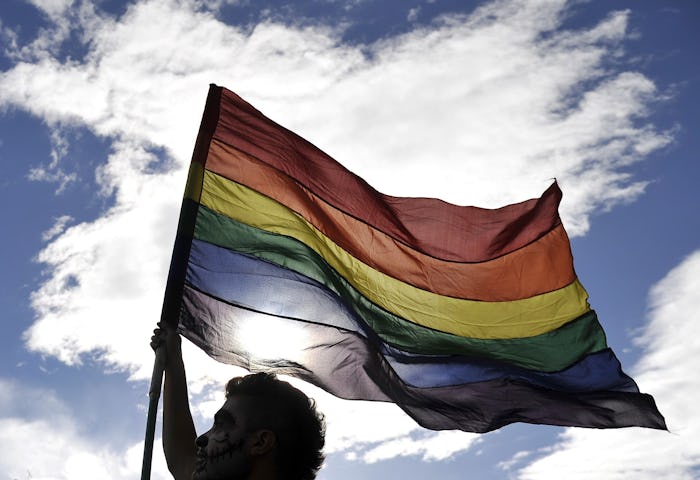Life

How To Explain Mississippi's New Anti-LGBT Law To Your Kids
On Tuesday, Mississippi Gov. Phil Bryant signed a religious freedom bill allowing people and institutions to discriminate against the LGBT community. So, that's terrible. As a parent or guardian, it's important to consider how to explain Mississippi's anti-LGBT law to your kids, because they may be coming to you with questions about it in the coming days. Even if they're blissfully unaware, you'll likely want to discuss it with them anyway, since this law is only part of a larger problem. (By the way, if you're looking for guidance on how to explain to your kids how awesome the new law is, this article definitely isn't for you.)
HB 1523, the controversial new law, basically says that the government won't punish people who, because of their religious beliefs, want to deny service to certain other people. The law covers three specific, protected beliefs: that marriage is only between a man and a woman, that extramarital sex is immoral, and that the distinction between "male" and "female" is biologically assigned at birth. So, for example, it's now perfectly legal for Mississippians to refuse to help gay couples with adoption or wedding-related services. Doctors can refuse to help patients with sexual reassignment surgery or counseling. Religious organizations can fire people based on their sexual orientation.
There have been many changes lately in terms of rights for the LGBT community, some positive, and some negative. Perhaps your kid is familiar with many LGBT individuals, and has seen how some of these changes have affected them. Perhaps your kid doesn't know anyone who identifies that way. Regardless, it's important to keep an open dialogue going. Here are a few tips on how to discuss this particular issue.
1. Be honest, while remaining hopeful.
This new law is very bad for a lot of people. Gay rights advocacy group Freedom for All Americans called it "the nation’s worst piece of anti-LGBT legislation." You don't have to hide that from your kids. You can discuss with them openly and specifically the ways in which people will be impacted by the law. They may want to talk about how it's unfair. Answer the questions they have, and encourage their empathy.
But while it's important for them to understand the pain this law may cause others, you can also remind them that the world has seen a lot of progress lately in terms of LGBT rights, and that it is possible to turn these sorts of things around with a lot of hard work and passion. Just look at gay marriage, which made strides far more quickly than most anticipated.
2. Humanize it.
If your kids don't quite understand the new law, humanize it for them by relating it to people that they know. If they don't know any LGBT individuals, you can always use yourself. For example, if you are a woman married to a man, you can ask your child to imagine what it would be like if, when you wanted to get married, people refused to help you because they didn't like who you loved.
It's also worthwhile to talk about the "religious freedom" aspect of the law. Maybe you're raising your kids to be religious, maybe you aren't. But it's important to specify that plenty of religious people are also open and accepting, and would never want to discriminate against LGBT individuals.
3. Place it in a broader context.
Unfortunately, this law is just one of many recent ones targeting LGBT individuals. North Carolina recently passed a bill compelling transgender people to use bathrooms that align with their sex assigned at birth. Georgia nearly passed a law very similar to Mississippi's, although luckily the governor vetoed it. In coming weeks, we may see similar action from various states.
Make sure to mention to your kid that Mississippi is not happening in a vacuum. But you can also use Georgia as an example of how a potentially-bad situation turned positive because of people's actions. Depending on how much your kids like Frozen, it might be especially interesting to them to know that Disney threatened to stop producing movies in Georgia if the state passed the bill, and that likely influenced the governor's decision to veto it.
4. Help them turn talk into action.
At the end of your discussion, your kids may want to stop talking and do something. Help them brainstorm ways they can take action. For starters, they can write an email to Gov. Bryant, or start a petition to overturn the law. Having them make an adorable drawing of why the law should change, that you could then share on social media couldn't hurt. (I'd certainly want to see it!)
All in all, don't hesitate to use the discouraging news out of Mississippi as a chance to practice empathy, honesty, and action. I'm sure your children will appreciate it — and if not now, definitely down the road.